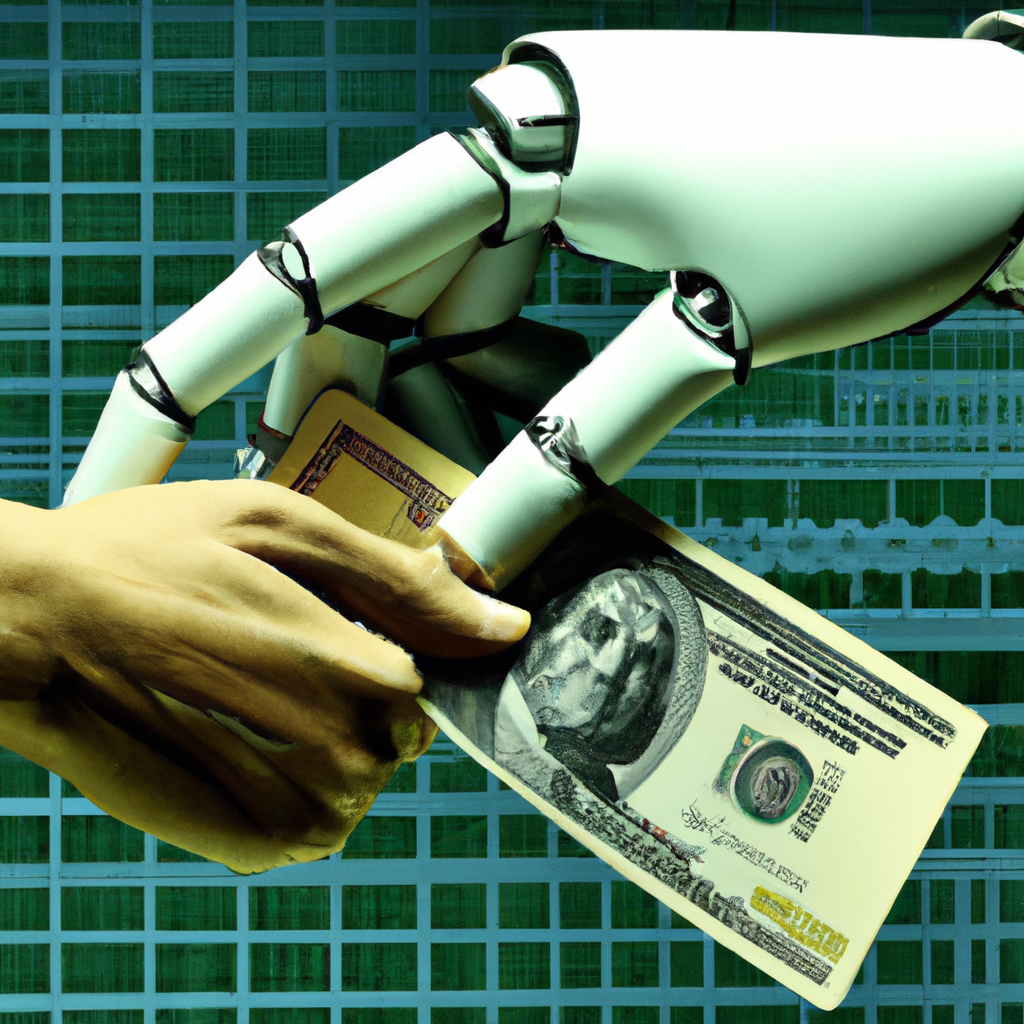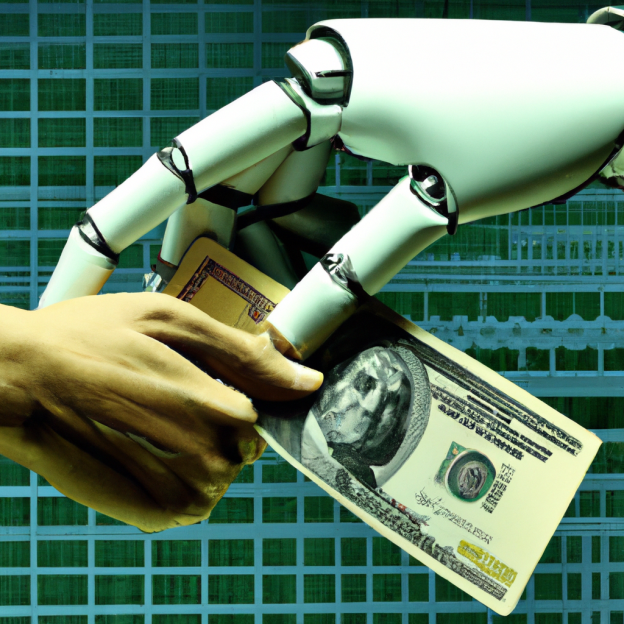So you’ve heard about AI and its potential to revolutionize industries, but did you know it can also help you make money? That’s right, artificial intelligence is not just for tech giants or sci-fi movies anymore. With its ability to collect and analyze vast amounts of data, AI can provide invaluable insights that can guide your financial decisions and increase your earning potential. In this article, we’ll explore how AI can be harnessed as a powerful tool to optimize investments, predict market trends, and ultimately, help you grow your wealth.

Understanding AI and its potential
Artificial Intelligence (AI) is a field of computer science that focuses on creating intelligent machines capable of performing tasks that typically require human intelligence. These tasks include speech recognition, problem-solving, decision-making, learning, and more. AI has the potential to revolutionize various industries and significantly impact our daily lives.
What is AI?
AI refers to the simulation of human intelligence in machines that are programmed to think, learn, and problem-solve like humans. It encompasses a wide range of technologies, including machine learning, natural language processing, computer vision, and robotics. AI systems can analyze vast amounts of data, recognize patterns, and make predictions or decisions based on that data.
How does AI work?
AI systems are designed to mimic human intelligence. They are trained on large datasets and use algorithms to learn patterns and derive insights. Machine learning, a subset of AI, enables computers to learn and improve from experience without explicit programming. This process involves feeding the AI system with relevant data, defining a set of objectives, and allowing it to learn and evolve based on the provided information.
The impact of AI on various industries
AI has the potential to transform various industries, including finance, healthcare, e-commerce, marketing, and more. In finance, AI algorithms can analyze market trends and make investment recommendations. In healthcare, AI can assist in diagnostics, drug discovery, and personalized treatment plans. In e-commerce, AI can optimize pricing strategies and provide personalized product recommendations. The potential applications of AI extend to almost every industry, offering significant benefits and opportunities.
AI’s potential in making money
The integration of AI into various businesses has opened up avenues for generating revenue. By leveraging AI technology, businesses can gain a competitive edge, enhance efficiency, and maximize profits. The ability of AI systems to analyze vast amounts of data, make accurate predictions, and automate tasks enables businesses to make informed decisions, optimize processes, and identify new opportunities in the market. AI’s potential in making money goes beyond just the financial sector, as it can impact almost any industry by improving operational efficiency and driving growth.
AI-powered Trading and Investing
The financial sector has greatly benefited from AI technology, particularly in the field of trading and investing. AI-powered systems and algorithms have revolutionized the way stock markets are analyzed, trading decisions are made, and investment strategies are formulated.
Utilizing AI in stock market analysis
AI algorithms can analyze large volumes of historical and real-time data, identify patterns, and predict market trends. Trading algorithms powered by AI can analyze multiple factors, including price movements, trading volumes, news sentiment, and macroeconomic indicators, to make informed trading decisions. By leveraging AI for stock market analysis, traders and investors can gain a deeper understanding of market dynamics and make more accurate predictions.
Automated trading systems
AI-powered automated trading systems, also known as algorithmic or quantitative trading systems, use predefined rules and AI algorithms to execute trades automatically. These systems operate based on a set of parameters, such as price movements, technical indicators, and market conditions. By removing human emotions and biases from the trading process, automated trading systems can react quickly to market changes and execute trades with precision and speed.
AI algorithms for investment recommendations
AI can also be utilized to generate investment recommendations based on specific objectives and risk tolerance. These algorithms analyze historical market data, company financials, and other relevant information to identify investment opportunities. By considering multiple factors simultaneously, AI algorithms can provide investors with personalized recommendations and help them make informed investment decisions.
Risk assessment and portfolio management
AI can assist in assessing and managing investment risks. Machine learning algorithms can analyze historical data and identify risk factors that may impact investment portfolios. Based on this analysis, AI-powered systems can provide risk assessments, optimize portfolio diversification, and suggest rebalancing strategies. These AI-driven risk management tools enable investors to make more informed decisions and mitigate potential losses.
AI in E-commerce and Sales
AI is revolutionizing the way businesses in the e-commerce and sales industry operate. By harnessing the power of AI, businesses can optimize their operations, enhance customer experiences, and drive sales.
Personalized product recommendations
AI algorithms can analyze customer data, purchase history, and browsing behavior to provide tailored product recommendations. By leveraging machine learning techniques, businesses can offer personalized product suggestions that resonate with individual customers’ preferences and increase the likelihood of a purchase. Personalized product recommendations not only improve the customer experience but also increase sales and customer satisfaction.
Analyzing customer behavior and trends
AI enables businesses to analyze vast amounts of customer data and uncover valuable insights about customer behavior, preferences, and trends. By utilizing machine learning algorithms, businesses can identify patterns, segment customers, and target specific segments with tailored marketing campaigns. Understanding customer behavior and trends allows businesses to implement strategies that resonate with customers, optimize marketing efforts, and drive sales growth.
Optimizing pricing strategies
AI-powered pricing algorithms can analyze market dynamics, competitor pricing, and customer demand to optimize pricing strategies. By leveraging machine learning algorithms, businesses can identify price-sensitive customers, determine optimal price points, and conduct dynamic pricing. Optimizing pricing strategies using AI technology can maximize revenue, increase profitability, and gain a competitive edge in the market.
Automating customer support and chatbots
AI-powered chatbots and virtual assistants are transforming customer support in the e-commerce industry. These chatbots can respond to customer queries, provide product information, and offer assistance in real-time. By automating customer support, businesses can provide round-the-clock service, reduce response times, and enhance customer satisfaction. AI-driven chatbots not only streamline customer support operations but also free up human resources to focus on more complex tasks, improving overall operational efficiency.

AI-driven Business Intelligence
AI is revolutionizing the field of business intelligence by enabling businesses to extract meaningful insights from vast amounts of data. AI-powered analytics tools and algorithms are transforming the way businesses make decisions, optimize processes, and drive growth.
Extracting insights from vast amounts of data
With the increasing availability of data, AI plays a crucial role in analyzing and extracting insights from massive datasets. AI algorithms can process and analyze structured and unstructured data, identify patterns, and uncover hidden correlations. By leveraging AI-powered analytics tools, businesses can gain a deeper understanding of their operations, identify trends, and make data-driven decisions.
Predictive analytics and forecasting
AI enables businesses to predict future outcomes and foresee trends through predictive analytics and forecasting. By utilizing historical data and machine learning algorithms, businesses can make accurate predictions about customer preferences, market trends, and demand patterns. Predictive analytics helps businesses optimize inventory management, plan marketing campaigns, and make strategic decisions to stay ahead of the competition.
Enhancing marketing strategies
AI-powered marketing analytics tools can analyze customer data, campaign performance, and market trends to identify successful marketing strategies. By leveraging AI algorithms, businesses can segment customers, determine the most effective marketing channels, and optimize marketing campaigns. AI-driven marketing analytics enhance the effectiveness of marketing efforts, improve customer targeting, and increase the return on investment (ROI) of marketing initiatives.
Improving customer segmentation
AI can assist businesses in creating precise customer segments based on various parameters such as demographics, purchasing patterns, and behavior. By analyzing customer data using AI algorithms, businesses can achieve a deeper understanding of their customer base, tailor marketing campaigns to specific segments, and deliver highly relevant and personalized experiences. Improved customer segmentation allows businesses to enhance customer engagement, increase customer loyalty, and drive revenue growth.
AI for Digital Marketing
Digital marketing has been revolutionized by AI technology. By automating processes, optimizing ad campaigns, and personalizing customer experiences, businesses can leverage AI to maximize their digital marketing efforts.
Automating ad campaigns and targeting
AI-powered advertising platforms enable businesses to automate ad campaigns and audience targeting. These platforms leverage machine learning algorithms to identify the most relevant audience for specific ads, optimize ad placements, and predict engagement rates. By automating ad campaigns, businesses can save time and resources while ensuring that their ads reach the right audience at the right time, ultimately increasing ad effectiveness and driving conversions.
Optimizing content generation and SEO
AI can be utilized to generate high-quality content for various digital platforms. Natural language processing algorithms can create engaging and relevant content that resonates with target audiences. Additionally, AI can help optimize search engine optimization (SEO) efforts by analyzing search trends, identifying relevant keywords, and suggesting content improvements. By leveraging AI for content generation and SEO, businesses can enhance their online presence, attract more organic traffic, and increase brand visibility.
Personalization and targeting
AI technology enables businesses to deliver personalized experiences to their customers. By analyzing customer data and leveraging machine learning algorithms, businesses can understand customer preferences, behaviors, and purchase patterns. This allows businesses to create personalized marketing messages, tailor product recommendations, and deliver targeted offers to individual customers. Personalization and targeting improve customer engagement, increase conversion rates, and foster long-term customer loyalty.
Social media management and analysis
AI-powered social media management tools help businesses streamline their social media presence. These tools can automate social media posting, schedule content, and analyze social media engagement. AI algorithms can also analyze social media conversations, identify trends, and track sentiment. By utilizing AI for social media management, businesses can optimize their social media strategy, increase brand awareness, and engage with their audience more effectively.
AI-powered Virtual Assistants
AI-powered virtual assistants are revolutionizing administrative tasks and enhancing productivity. By leveraging voice recognition and natural language processing technologies, virtual assistants can streamline various tasks and improve time management.
Streamlining administrative tasks
Virtual assistants powered by AI technology can handle repetitive administrative tasks such as managing emails, scheduling appointments, and organizing calendars. By offloading these administrative burdens, businesses can free up time for more strategic and high-value tasks, improving overall productivity and efficiency.
Voice recognition and natural language processing
AI-powered virtual assistants excel in voice recognition and natural language processing. They can understand and respond to spoken commands and queries, enabling more intuitive and hands-free interaction. Virtual assistants can draft emails, initiate phone calls, and perform other tasks simply by following voice instructions. This technology significantly improves convenience and efficiency in day-to-day operations.
Automated customer service interactions
Virtual assistants can automate customer service interactions by resolving common customer queries and providing basic support. By leveraging AI algorithms, virtual assistants can understand customer inquiries, provide accurate responses, and escalate more complex issues to human agents when necessary. Automated customer service interactions reduce response times, improve customer satisfaction, and free up human resources for more specialized tasks.
Calendar management and reminders
Virtual assistants are excellent tools to manage calendars and send reminders. By integrating with calendars and scheduling platforms, virtual assistants can create and update appointments, set reminders, and send notifications. This allows individuals and businesses to stay organized, never miss important deadlines, and optimize time management.
AI in Healthcare and Medicine
AI is revolutionizing the healthcare and medicine industry with its potential to improve diagnostics, drug discovery, patient care, and overall healthcare efficiency.
Diagnostic assistance and medical imaging
AI algorithms can analyze medical images, such as X-rays, CT scans, and MRIs, to assist in diagnostics. By comparing images to vast databases, AI can help identify abnormalities and assist radiologists in making accurate diagnoses. AI-based diagnostic assistance improves precision, reduces diagnostic errors, and can help speed up the diagnosis process.
Drug discovery and development
AI is transforming the drug discovery and development process by analyzing vast amounts of data, including biomedical literature, genetic information, and clinical trial data. By utilizing machine learning algorithms, AI can identify potential drug targets, predict drug efficacy, and accelerate the drug discovery process. AI-powered drug discovery enables faster and more efficient development of new therapies, potentially revolutionizing healthcare and improving patient outcomes.
Patient monitoring and personalized treatment
AI technology enables continuous monitoring of patients’ vital signs, symptoms, and treatment responses. By analyzing streams of data from wearable devices, electronic health records, and other sources, AI systems can provide real-time insights and personalized treatment recommendations. AI-powered patient monitoring improves the quality of patient care, enables early detection of health issues, and facilitates proactive interventions to prevent complications.
Improving healthcare efficiency
AI can optimize healthcare processes, improve efficiency, and reduce costs. AI algorithms can analyze patient data and patterns to predict hospital readmissions, optimize bed allocation, and streamline resource utilization. By leveraging AI-driven solutions, healthcare providers can better allocate resources, improve workflow management, and enhance overall healthcare delivery.
Automated Data Analysis with AI
AI technology is transforming the field of data analysis, making it faster, more efficient, and more accurate. By automating tasks and leveraging machine learning algorithms, businesses can extract valuable insights from large datasets, improve decision-making processes, and optimize business strategies.
Identifying patterns and correlations
AI-powered data analysis tools can identify hidden patterns and correlations within large datasets. By analyzing structured and unstructured data, AI algorithms can uncover relationships and derive insights that may not be apparent to the human eye. AI-driven data analysis enables businesses to make data-driven decisions, identify emerging trends, and gain a competitive edge in the market.
Automated data cleaning and preprocessing
AI can automate the process of cleaning and preprocessing data, which is often time-consuming and error-prone. By utilizing AI algorithms, businesses can automatically detect and correct data errors, handle missing values, and standardize data formats. Automated data cleaning and preprocessing streamline the data analysis workflow, ensure data accuracy, and save valuable time and resources.
Streamlining data analysis workflows
AI technology enables businesses to automate various steps of the data analysis process. AI algorithms can handle data cleaning, feature selection, model training, and result interpretation. By automating these tasks, businesses can accelerate the data analysis process, reduce human errors, and focus on extracting meaningful insights from the data.
Improving decision-making processes
AI-driven data analysis enhances decision-making processes by providing accurate and timely insights. By leveraging machine learning algorithms, businesses can generate predictions, recommendations, and forecasts based on historical data. These AI-powered insights enable businesses to make more informed decisions, optimize business strategies, and gain a competitive advantage.
AI-powered Fraud Detection
Fraud detection is a critical concern for businesses across industries. AI technology has emerged as a powerful tool in the fight against fraud, helping businesses detect and prevent fraudulent activities in real-time.
Real-time fraud monitoring and prevention
AI-powered fraud detection systems can continuously monitor transactions and identify potential fraudulent activities in real-time. By leveraging machine learning algorithms, these systems can analyze numerous data points, such as customer behavior, transaction history, and industry trends, to identify any anomalies or suspicious patterns. Real-time fraud monitoring enables businesses to detect and prevent fraud before it causes significant financial loss.
Anomaly detection and pattern recognition
AI algorithms can identify anomalies and patterns in large volumes of data, enabling businesses to detect fraudulent activities. By analyzing historical data and considering various factors, such as transaction frequency, transaction size, and location, AI-powered systems can identify outliers and flag potentially fraudulent transactions. Anomaly detection and pattern recognition enable businesses to proactively identify and prevent fraud, reducing financial losses and mitigating risks.
AI-based authentication systems
AI technology can improve authentication systems by analyzing multiple factors, such as biometric data, user behavior, and device information. By leveraging machine learning algorithms, AI-based authentication systems can identify and verify legitimate users, detect fake identities, and prevent unauthorized access. AI-powered authentication systems enhance security, protect sensitive information, and reduce the risk of identity theft or fraudulent activities.
Reducing financial losses
The integration of AI into fraud detection and prevention efforts helps businesses minimize financial losses caused by fraudulent activities. By leveraging AI algorithms and real-time monitoring, businesses can identify and prevent fraud at an early stage, minimizing the impact on their financial stability. The use of AI-powered fraud detection systems provides businesses with the necessary tools to protect their assets, maintain customer trust, and preserve their reputation.
Conclusion
AI offers immense potential for businesses to make money and drive growth in various industries. By harnessing the power of AI, businesses can optimize operations, enhance decision-making processes, and create personalized experiences for customers. From AI-powered trading and investing to AI-driven healthcare advancements, the potential applications of AI are vast and ever-expanding. To stay competitive in today’s fast-paced world, businesses must embrace AI technology and leverage its potential to revolutionize their operations, improve financial outcomes, and pave the way for a prosperous future.
